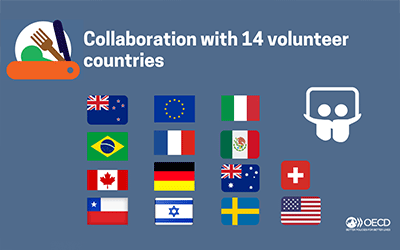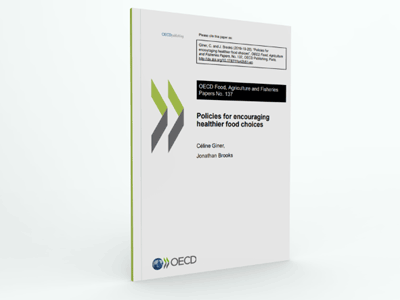Food-chain analysis network
Bringing together experts at the OECD to share data and ideas on food systems
The Food Chain Analysis Network (FCAN) is an OECD expert group specialised in food systems’ analysis. The FCAN explores issues related to gathering and analyzing data on food systems with a view to informing multi-country dialogue and supporting the development of better policies.
The Food Chain Analysis Network works with the Secretariat in developing a common understanding of simplified nutritional food labelling schemes
In 2021-2022, the FCAN is assisting the OECD Secretariat in developing a common understanding of simplified nutritional food labelling policies given the rapid proliferation of these schemes across the world. OECD research does not assess which policies work best in changing consumers' habits, but rather provides recommendations on how to create an enabling policy framework. By the end of 2022, this OECD work will provide insights on:
- How-to develop and implement the schemes
- How-to organize governance with a focus on stakeholders’ involvement and potential trade implications
- How-to measure impacts on consumers and the food environment
The Secretariat has been collaborating with 12 volunteer countries that have implemented or are in the process of implementing nine different simplified nutritional food labelling policies, as well as the United States and the European Union.
Following the FCAN meeting held on 24 June 2021, volunteer countries responded to an extensive online questionnaire. During November and December 2021, the Secretariat organised 11 national virtual consultations with different national stakeholder organisations such as private sector representatives (farmers, food processors, retailers), civil society, research organisations and governments.
At the latest FCAN meeting held on 20-21 January 2022, country food policy experts shared their national experiences of policy making in this area, focusing on how to develop and implement the schemes, how to organise governance and monitoring and how to measure impacts on consumers and the food environment.
FCAN discussions on making simplified nutritional food labelling policies highlighted the need to breakdown silos among government agencies, private sector actors and civil society to enable policy coherence across the food system.
The key lessons from the January 2022 FCAN meeting are the following:
- How-to develop simplified nutritional food labelling policies: The government-led policy development process needs to be transparent. While this takes time, it is essential for building trust in the system. Stakeholders should be involved from the initial policy design stage and through to the development and use of evidence.
- How-to implement simplified nutritional food labelling policies: The policy implementation process has to be gradual to allow for private stakeholders to adjust and comply with the policy, and for consumers to become aware of it. Stakeholders’ involvement can provide leverage for the policy implementation - in particular retailers’ interest in the policies as they are key actors. Consumers need to be empowered to use the labels (and not only to be aware of them). Online tools make it possible to consider opportunities to provide consumer nudges.
- How-to organise governance and monitoring: Setting-up a formal well-funded mechanism responsible for the day-to day functioning of the policy and for implementing improvements is necessary. When schemes are implemented at the supranational level, coordination across countries becomes key. The need for an international dimension in the governance effort was also discussed in terms of how to facilitate exchanges of information across public entities and with food systems’ stakeholders.
- How-to overcome evidence gaps: With regards to evidence gaps, how to scale up efforts with adequate funding and formal evolution plans was discussed. Aspects of trust, including which agency should be responsible for collecting food data and how can it be trusted by parties submitting the data, were also explored. It was noted that in some countries, voluntary public private arrangements for the provision of data seem to be providing win-win solutions for all involved.
The next step of this work involves the drafting of an OECD report by the end of 2022.
Latest update
Policies for encouraging healthier food choices
This report examines the evidence base on the health implications of unhealthy diets and its associated burden on health systems. It takes stock of current knowledge on the effectiveness of policy instruments and proposes a four-track policy approach to encourage healthier food choices that is consistent with wider objectives for the food and agriculture sector.
Meetings and documents
Meetings
All documents, agendas and presentations from the meetings of the Food Chain Analysis Network are available for download below.
- 1st Meeting - Inaugural network meeting, December 2010
- 2nd Meeting - Building a sustainable food chain, September 2011
- 3rd Meeting - Mobilising the food chain for health, October 2012
- 4th Meeting - Food waste along the supply chain, June 2013
- 5th Meeting - Competition along the food chain, October 2013
- 6th Meeting - Public-private partnerships for agricultural innovation, October 2014
- 7th Meeting - The food chain and consumers, October 2015
- 8th Meeting - Reducing food loss and waste in the retail and processing sectors, June 2016
- 9th Meeting - Information needs for policies to encourage healthier food choices, May 2017
- 10th Meeting - Improving the Food Information Base to Analyse Health-Related Food Policies, October 2018
- 11th Meeting - Policy options for the food system
- 12th Meeting - New policy approaches for food insecure households, September 2020
- 13th Meeting - “How-to” of simplified food labelling policy making, June 2021
- 14th Meeting - Making simplified nutritional food labelling policies: Lessons from national experiences, January 2022
Food-chain analysis publications
Access all OECD publications on food-chain analysis on the OECD iLibrary.
Agriculture and fisheries publications
All of our food, agriculture and fisheries research and analysis is available to read online for free on the OECD iLibrary.
Sign up for our newsletter
Sign-up to our agriculture newsletter to receive periodic e-mail updates on new publications, videos and analysis.
Contact us with your questions
If you have questions about OECD research and analysis on agriculture, please feel free to contact us directly.

